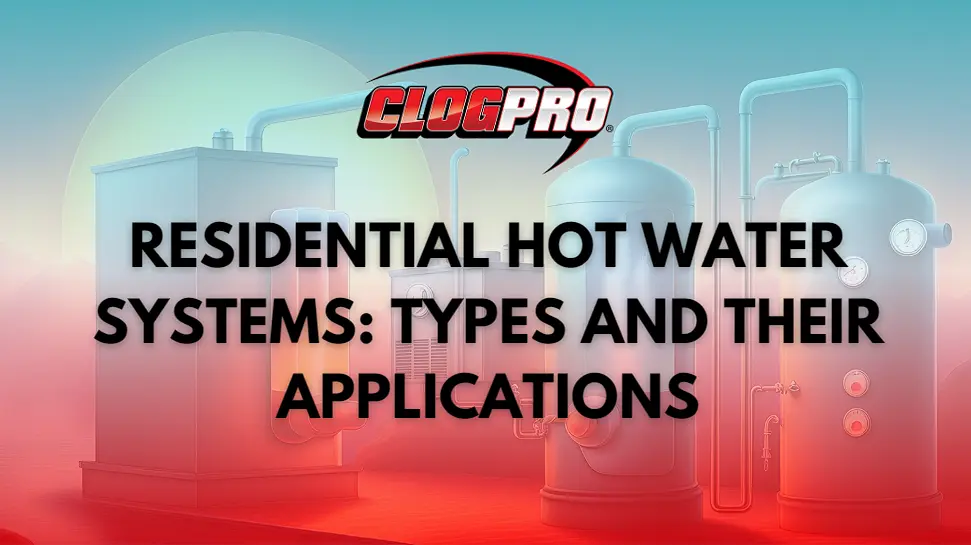
What Are the Different Types of Hot Water Heaters for Your Home?
Are you thinking about getting a new hot water system for your home? There are more options than ever. So, whether you’re tired of having a traditional tank heater and want to see what else is out there, or you’re looking for a specific kind of water heater that can meet your needs, at Clog Pro, we take pride in helping our customers choose the best water heater for their home.
There are several options that are worth exploring when deciding on a residential hot water system. Some of the most popular include:
- Traditional tank heaters store and preheat water, which is great for constant supply.
- Tankless water heaters provide hot water on demand and save space, but they need regular maintenance.
- Heat pump water heaters use surrounding air and are energy-efficient, ideal for moderate climates.
- Solar water heaters use sunlight, offering eco-friendly and cost-effective heating.
Comparing Types of Water Heaters – Which Is Best for You?
Each system has unique benefits and applications, from energy-saving to space efficiency. More details can help match the right system to your specific situation.
Let’s take a closer look at each type of system.
Traditional Tank Heaters
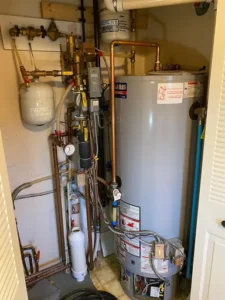 Traditional tank heaters store and preheat a large volume of water in a tank, ready for use whenever needed. These storage tank water heaters are the most common type for residential use. They maintain a reservoir of hot water, which guarantees you always have hot water available on demand.
Traditional tank heaters store and preheat a large volume of water in a tank, ready for use whenever needed. These storage tank water heaters are the most common type for residential use. They maintain a reservoir of hot water, which guarantees you always have hot water available on demand.
One key factor to take into account in picking out the right tankless water heater is the tank’s capacity. The tank size you need depends on the number of people in your household and your hot water usage habits. A larger tank can store more hot water, ideal for bigger families or homes with high water usage.
Another important aspect is the recovery rate, the speed at which the heater can reheat water after the hot water has been used. A higher recovery rate means the tank can replenish hot water faster, so you won’t have to wait long if the tank runs out. This is especially useful during peak usage times, like mornings or evenings, when multiple showers might be taken back-to-back.
We recommend traditional tank water heaters for:
- People on a tight budget who need a lower upfront cost
- Homeowners with predictable hot water use (small to mid-sized families)
- Residents in areas with low electricity or gas rates
- People who don’t mind running out of hot water occasionally (e.g., fewer back-to-back showers)
Tankless Water Heaters
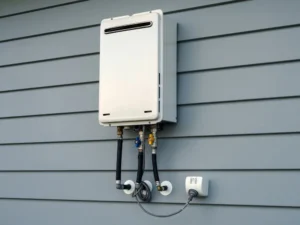 While traditional tank heaters store hot water for immediate use, tankless water heaters provide an on-demand solution by heating water only when needed. This means you won’t have to worry about running out of hot water during a long shower or filling the bathtub. The convenience of having hot water whenever you need it can bring a sense of ease and comfort to your daily routine.
While traditional tank heaters store hot water for immediate use, tankless water heaters provide an on-demand solution by heating water only when needed. This means you won’t have to worry about running out of hot water during a long shower or filling the bathtub. The convenience of having hot water whenever you need it can bring a sense of ease and comfort to your daily routine.
Tankless water heaters are often praised for their energy efficiency. Since they don’t store hot water, there’s no energy wasted on keeping a tank of water hot all day long. This can lead to significant savings on your energy bills.
When it comes to installation, tankless water heaters are typically more compact than traditional tank systems, making them a great option if you’re short on space. However, the installation process can be more complex. It may require professional help, especially if you need to upgrade your home’s electrical system or gas lines to accommodate the new unit.
Tankless water heater maintenance is straightforward but essential for excellent performance. Regularly descaling the unit, especially in areas with hard water, can prevent mineral buildup and ensure efficient operation. Overall, tankless water heaters offer a modern, efficient alternative to traditional systems, making them a worthy consideration for your home.
We recommend tankless water heaters for:
- People who want endless hot water (great for frequent showers or large tubs)
- Homeowners looking to save space — these are compact and wall-mounted
- Energy-conscious individuals seeking long-term efficiency
- Households with staggered water usage throughout the day (not all at once)
Heat Pump Water Heaters
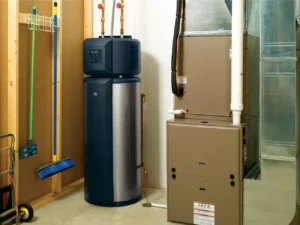 Heat pump water heaters offer an energy-efficient solution by transferring heat from the surrounding air to heat your water. These systems are often called hybrid water heaters because they combine traditional electric heating elements with heat pump technology. By leveraging ambient air, they can greatly reduce energy consumption compared to conventional electric water heaters.
Heat pump water heaters offer an energy-efficient solution by transferring heat from the surrounding air to heat your water. These systems are often called hybrid water heaters because they combine traditional electric heating elements with heat pump technology. By leveraging ambient air, they can greatly reduce energy consumption compared to conventional electric water heaters.
When contemplating heat pump water heaters, it’s vital to factor in their cost considerations. While the initial purchase price is typically higher than traditional water heaters, the long-term savings on your energy bills can compensate for this difference. Additionally, many utilities offer rebates or incentives for installing energy-efficient systems, which can further offset the upfront costs.
Another important aspect to consider is the lifespan of heat pump water heaters. Generally, these units have a longer lifespan, often 10-15 years or more, compared to standard electric water heaters, which usually last around ten years. Proper maintenance, such as regular filter cleaning and annual inspections, can help extend their operational life.
We recommend heat pump water heaters for:
- Energy savers who want low operating costs over time
- People with a garage, basement, or utility room with enough space and airflow
- Households that don’t need rapid or back-to-back hot water usage
- Environmentally conscious users wanting sustainable technology without solar
Solar Water Heaters
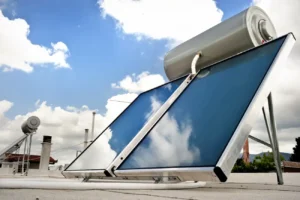 To guarantee the power of the sun, solar water heaters offer an environmentally friendly and cost-effective solution for your home’s hot water needs. These systems use solar panels, typically installed on your roof, to capture sunlight and convert it into heat. This heat is then transferred to your water supply, providing you with a renewable source of hot water.
To guarantee the power of the sun, solar water heaters offer an environmentally friendly and cost-effective solution for your home’s hot water needs. These systems use solar panels, typically installed on your roof, to capture sunlight and convert it into heat. This heat is then transferred to your water supply, providing you with a renewable source of hot water.
One of the biggest advantages of solar water heaters is their minimal environmental impact. Reducing reliance on fossil fuels and decreasing greenhouse gas emissions significantly contribute to a cleaner planet. This can instill a sense of responsibility and pride in your choice. Additionally, while the initial installation cost seems high, the long-term savings on your energy bills and the potential for tax credits or incentives make it a wise investment.
Regarding reliability, solar water heaters are generally low-maintenance and have warranties ranging from 10 to 20 years. This means you can enjoy peace of mind knowing your system is protected. However, regular maintenance is crucial to keeping the system running efficiently.
We recommend solar water heaters for:
- People planning to stay in their home long-term to recoup investment
- Green energy enthusiasts aiming to reduce their carbon footprint
- Households with backup systems or lower dependency on instant hot water
- Those eligible for tax incentives or rebates for renewable energy upgrades
Frequently Asked Questions About Water Heaters
Q. What safety measures should be taken when using residential hot water systems?
When using residential hot water systems, you’ve got to prioritize safety. Here are a few guidelines we recommend as a minimum:
- Always set the thermostat to a safe temperature, typically around 120°F, to avoid scalding. Regularly check for leaks and corrosion
- Guarantee proper ventilation for gas water heaters to prevent carbon monoxide buildup.
- Install pressure relief valves and maintain them.
- Lastly, follow local codes and have a professional inspect your system annually to ensure it operates safely.
Q. Are there any local codes for installing hot water systems?
Local codes for installing hot water systems often exist, varying by region. You’ll need to check with your local building department for specific regulations. These codes help guarantee safety and efficiency, covering aspects like placement, venting, and fuel type. Adhering to these guidelines is vital to avoid fines and ensure your system operates safely.
At Clog Pro, our technicians are required to follow all local codes and regulations. Whether your project is located in Oregon or Washington, you can be sure you’ll be in full compliance.
Q. How do distribution systems affect energy efficiency in hot water systems?
Distribution systems play a massive role in the energy efficiency of hot water systems. If your pipes are well-insulated or too long, you’ll retain heat as water travels from the heater to your faucet. This means your system has to work harder and use more energy.
By optimizing the distribution system with proper insulation and minimizing pipe lengths, you can greatly improve overall efficiency and save on energy bills.
Q. What are the size and space requirements for different hot water systems?
When considering size and space requirements for different hot water systems, you’ve got to think about where they’ll fit in your home.
- Storage tank heaters need more space due to their bulky tanks.
- Tankless heaters are compact and can be wall-mounted, saving you room.
- Heat pump heaters require sufficient ventilation space.
- Solar water heaters often need roof space for panels.
Always check manufacturer specifications and local codes for precise requirements.
Q. What warranty options are available for residential hot water systems?
When considering warranty options for residential hot water systems, it can vary by manufacturer, but here’s what you’ll typically find:
- Storage tank water heaters have warranties ranging from 6 to 12 years.
- Tankless water heaters often offer warranties of 10 to 15 years.
- Heat pumps have warranties between 5 to 10 years.
- Solar water heaters usually have warranties between 5 to 10 years.
As always, check the specifics, as they can vary by model and manufacturer.
Have Questions? Call Us for Water Heater Installation in Vancouver WA and Portland OR
Every home is different, and so is every hot water need. Whether you’re looking for energy savings, long-term reliability, or a more sustainable option, the right system can make a big difference. At Clog Pro, our expert water heater installation and repair services take the guesswork out of the process with expert guidance and honest recommendations tailored to your home and budget.
Ready to upgrade with confidence? Contact us today to talk through your options and schedule your installation.
